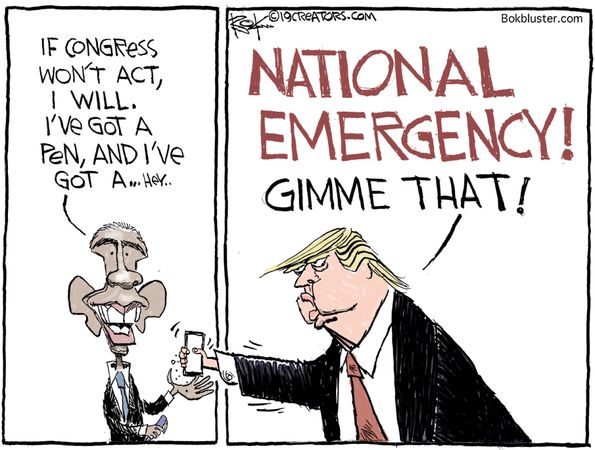You are using an out of date browser. It may not display this or other websites correctly.
You should upgrade or use an alternative browser.
You should upgrade or use an alternative browser.
The Inevitable New The Inevitable Trump Mocking Thread
- Thread starter Nonononono
- Start date
Sheriff Joe
DA
Must be bad if head race baiter Al Sharpton is alarmed.
Civil Rights Activist Says Could Have Started Race War...
SHARPTON: HE SHOULD PAY PRICE IF STAGED...
'PRANKSTER ACTIVISTS' SWARM DC...
Civil Rights Activist Says Could Have Started Race War...
SHARPTON: HE SHOULD PAY PRICE IF STAGED...
'PRANKSTER ACTIVISTS' SWARM DC...
How many blow jobs has this guy given? A lot more than one, I gay-ran-tee it...
https://www.dailykos.com/stories/20...bes-the-LGBTQ-community-as-the-modern-day-KKK
https://www.dailykos.com/stories/20...bes-the-LGBTQ-community-as-the-modern-day-KKK
Sheriff Joe
DA
Yeah, he is a kook and yeah, the queer community is a hate group.How many blow jobs has this guy given? A lot more than one, I gay-ran-tee it...
https://www.dailykos.com/stories/20...bes-the-LGBTQ-community-as-the-modern-day-KKK
Hüsker Dü
DA
Another day another frightened (he might give in to temptation) GOPer . . . and it's called discipline, push away from the table once you are feeling full.How many blow jobs has this guy given? A lot more than one, I gay-ran-tee it...
https://www.dailykos.com/stories/20...bes-the-LGBTQ-community-as-the-modern-day-KKK
Hüsker Dü
DA
You would know.Yeah, he is a kook and yeah, the queer community is a hate group.
White woman insults restaurant manager for speaking Spanish --
-- in a Mexican restaurant.
https://www.latinorebels.com/2019/02/17/anotherracistvideo/
-- in a Mexican restaurant.
https://www.latinorebels.com/2019/02/17/anotherracistvideo/
Have you spent time “infiltrating” them?Yeah, he is a kook and yeah, the queer community is a hate group.
Hüsker Dü
DA
MAGA!White woman insults restaurant manager for speaking Spanish --
-- in a Mexican restaurant.
https://www.latinorebels.com/2019/02/17/anotherracistvideo/
MAGA!
I wonder how she asks for extra salsa for her burrito.
Hüsker Dü
DA
"Hell them there is merican words, good words, the best words! What?"I wonder how she asks for extra salsa for her burrito.
Sheriff Joe
DA
Don't need to, I have you.Have you spent time “infiltrating” them?
Hüsker Dü
DA
You know cowardly, you see it in the mirror at the bath house.Fake News from a real coward.
Sheriff Joe
DA
So, you are a homophobe as well as an anti-American racist.You know cowardly, you see it in the mirror at the bath house.
Hüsker Dü
DA
You are obviously obsessed at the least and possibly a closet queer (not that there is anything wrong with that, just playing to your fears) and I am anti-your idea of a pro-Putin America. How does it feel to be a sock puppet for Kremlin concerns? Aka Putin's hand up your arse.So, you are a homophobe as well as an anti-American racist.
Sheriff Joe
DA
Sounds like you are getting a bit emotional.You are obviously obsessed at the least and possibly a closet queer (not that there is anything wrong with that, just playing to your fears) and I am anti-your idea of a pro-Putin America. How does it feel to be a sock puppet for Kremlin concerns? Aka Putin's hand up your arse.
Sheriff Joe
DA
Yes, just what we need in America, more illegal breeders.
Breitbart
EXCLUSIVE: Leaked Photos Show U.S. Border Facility Overwhelmed by Migrants
https://www.breitbart.com/border/20...-u-s-border-facility-overwhelmed-by-migrants/
‘The flow shows no signs of abating and it keeps increasing’

Leaked photos reveal the extent to which U.S. border facilities are being overwhelmed by the inflow of migrants from Central America and other nations. Breitbart exclusively obtained the photos that are reminiscent of the Obama-era border surge. The images depict a Customs and Border Protection (CBP) processing, detention, and transport facility at a U.S. port-of-entry in the El Paso, Texas. According to the source of the images, the photos were taken on February 17, 2019.
Breitbart
EXCLUSIVE: Leaked Photos Show U.S. Border Facility Overwhelmed by Migrants
https://www.breitbart.com/border/20...-u-s-border-facility-overwhelmed-by-migrants/
‘The flow shows no signs of abating and it keeps increasing’

Leaked photos reveal the extent to which U.S. border facilities are being overwhelmed by the inflow of migrants from Central America and other nations. Breitbart exclusively obtained the photos that are reminiscent of the Obama-era border surge. The images depict a Customs and Border Protection (CBP) processing, detention, and transport facility at a U.S. port-of-entry in the El Paso, Texas. According to the source of the images, the photos were taken on February 17, 2019.
Hüsker Dü
DA
"Leaked"? Sucker.Yes, just what we need in America, more illegal breeders.
Breitbart
EXCLUSIVE: Leaked Photos Show U.S. Border Facility Overwhelmed by Migrants
‘The flow shows no signs of abating and it keeps increasing’
Leaked photos reveal the extent to which U.S. border facilities are being overwhelmed by the inflow of migrants from Central America and other nations. Breitbart exclusively obtained the photos that are reminiscent of the Obama-era border surge. The images depict a Customs and Border Protection (CBP) processing, detention, and transport facility at a U.S. port-of-entry in the El Paso, Texas. According to the source of the images, the photos were taken on February 17, 2019.



